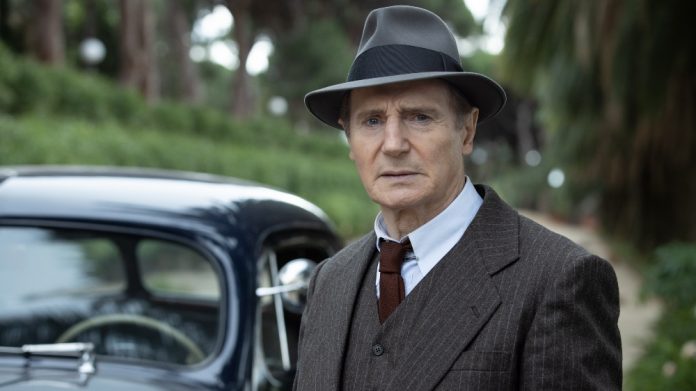Drugs, sex, and murder dog private investigator Philip Marlowe through the seedy underbelly of Los Angeles in Marlowe. Set in 1939, the indie film stars Liam Neeson as the famous Raymond Chandler character, who is just beginning his career as a detective.
Based on a novel by John Banville that was adapted by Oscar winner William Monahan (The Departed), the movie finds Marlowe eking out a living after being fired from the LAPD. Neeson is joined by a sterling cast of veteran actors, including Diane Kruger, Danny Huston, Colm Meaney, Alan Cumming, and Oscar winner Jessica Lange — all exceptional performers who relish delivering Monahan’s rich dialogue.
Oscar-winning filmmaker Neil Jordan directed Marlowe, having previously worked with Neeson on several films, notably Michael Collins. In addition to his groundbreaking crime drama The Crying Game, which won him an Oscar for Best Original Screenplay, Jordan’s other feature credits include the gangster drama Mona Lisa, the star-studded ’90s adaptation of Interview With the Vampire, the Nick Nolte-led crime movie The Good Thief, and the Jodie Foster thriller The Brave One.
Above the Line recently spoke to Jordan via Zoom, and he explained his approach to the character, why he thought Neeson was the right man for the job, and why they decided to shoot the film in Barcelona.
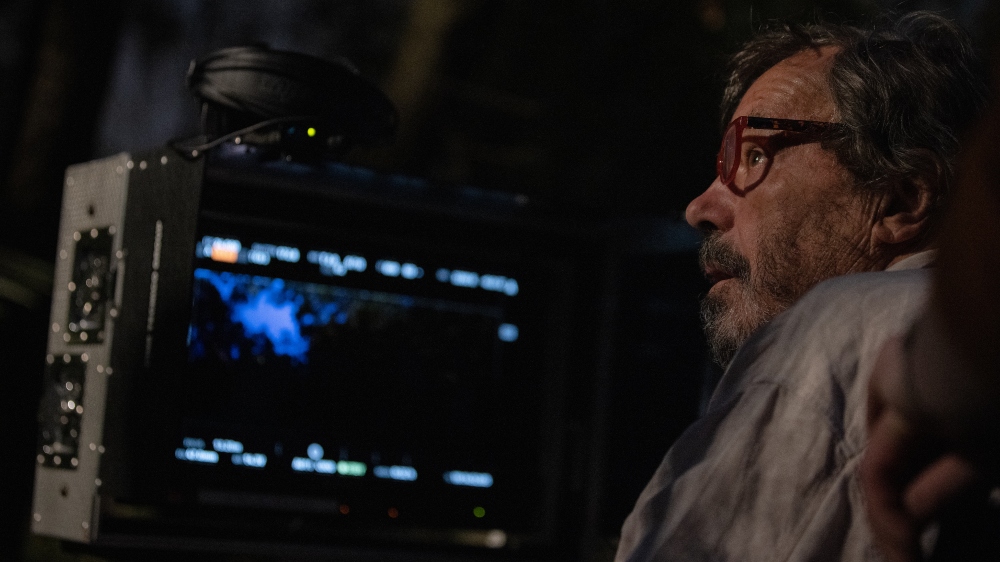
Above the Line: How did you and Liam Neeson set out to approach the Philip Marlowe character?
Neil Jordan: I’ve made movies with Liam in the past, and he’s had tremendous success playing a kind of vengeful role. You know, action movies. I thought, “I’d love to see the smoldering Liam Neeson. I’d love to see him inhabit a character that gave him more time to express his talents.”
Liam [then] brought me William Monahan’s script. It was a wonderful screenplay that introduced elements to Marlowe that were a surprise to me. Like, that he has an Irish background, [and] that he fought for the Irish Rifles in the first World War.
ATL: What’s wrong with Marlowe when we meet him in this film? How did he get into this position where he’s hated by cops and looked down upon by his clients?
Jordan: It’s because he reads books, isn’t it? I mean he’s a guy in Los Angeles who reads books. Maybe not [Arthur] Schopenhauer, but he definitely has some acquaintance with James Joyce and Christopher Marlowe. He’s a guy with a brain and a reading habit who probably doesn’t belong in Los Angeles in the first place.
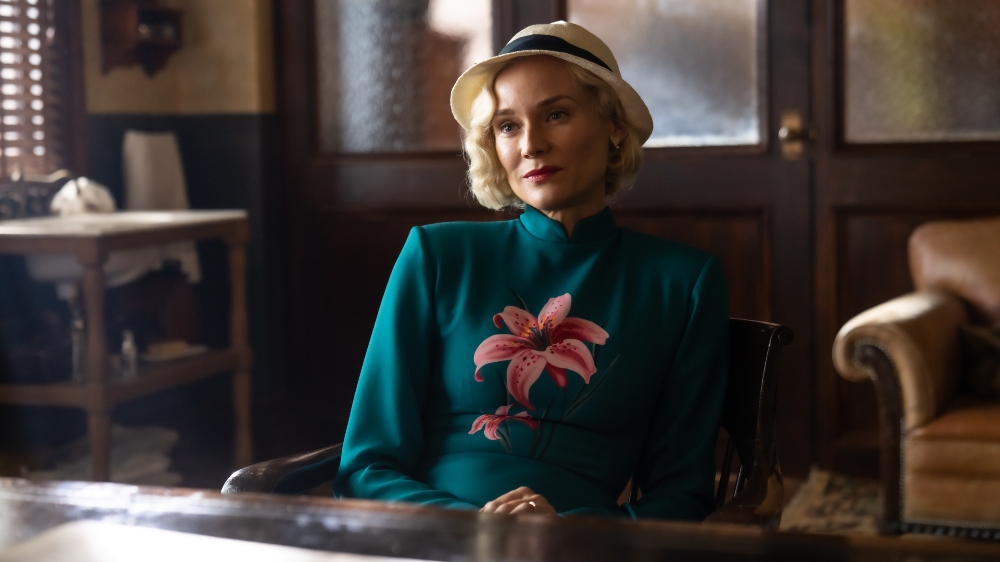
ATL: Even when Chandler was writing this character, he knew that Marlowe didn’t fit in. Your characters here joke that he’s a “knight in shining armor.”
Jordan: I think his heart was broken somewhere. Maybe a blonde in his past? When we open the movie, Marlowe is looking out his office window at a woman across the street, a typist from an Edward Hopper kind of painting. That was very important for Liam, for some reason. He said, ‘I have to be looking across the street at this woman.’ I actually cast my wife in that role, which helps give the sense that there is not even [a] chance of a romantic possibility for Marlowe. That’s a life he lost.
As for the first World War, Marlowe and Floyd Hanson, the character Danny Huston plays, both experienced that kind of grinding warfare [that] I suppose they have at the moment in Ukraine. Hanson says on the battlefield he saw his friend’s tooth in a whiskey glass, and he drank the whiskey.
Our sense is that both of those characters have come out of some bloody, grinding, meat carnage, you know what I mean? They’ve survived. They know the worst that can happen to a human being. That was my sense of Marlowe in this movie, and that was Liam’s sense as well.
ATL: Would you say that nothing surprises Marlowe because he has such a low opinion of humanity in general?
Jordan: Probably a low opinion of himself as well.
ATL: As you go through Chandler’s books, it gets harder and harder for him to make sense of Marlowe, no?
Jordan: I know what you mean, but can you explain to me why he always takes those Mickey Finns? He always falls for the drugged drink.
I normally write my own scripts, but this script is by William Monahan. So in this case, I was a director working with a beautiful set of dialogues and templates someone else had written. But the one thing I would not do is let Marlowe be so stupid that he would take a Mickey Finn. I rewrote that scene where he pours out the drugged drink into a potted plant.
Maybe it’s because all his life Chandler felt he was slumming. He wanted to be Thomas Mann or somebody. He felt writing detective stories was a compromise. I think that sense of compromise led [to] how we approached Marlowe.
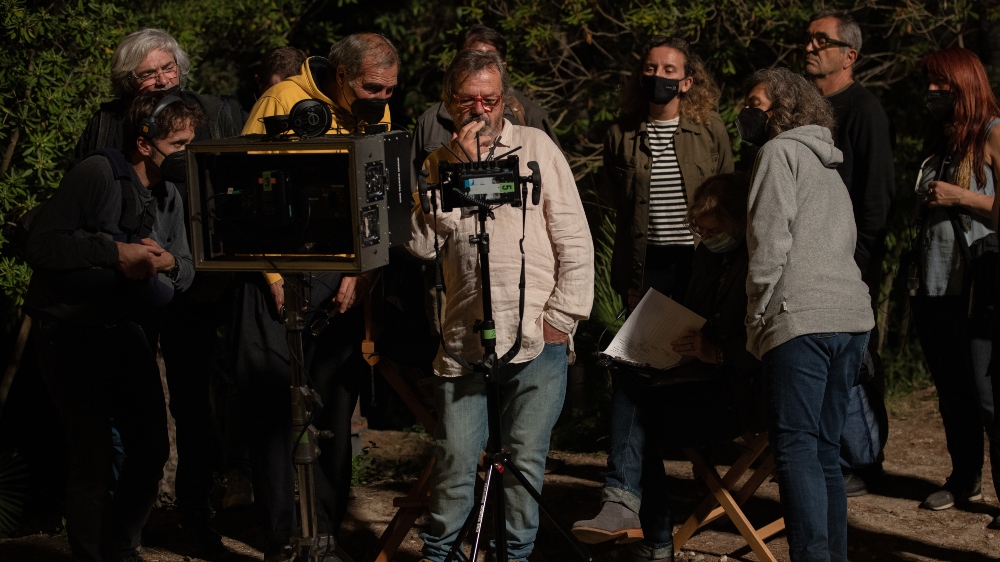
ATL: Marlowe also seems to have greater success questioning people rather than searching for actual clues.
Jordan: William came up with these complicated encounters between Marlowe and people who are all hiding the truth from him. I thought it was a wonderful thing to work with. The entire movie is a series of very long encounters. He meets Clare Cavendish (Diane Kruger), [and] he brings about her soul-searching and revelations. He meets her mother, Dorothy, (Jessica Lange), [and] Hanson, and eventually, Lou Hendricks (Alan Cumming). My only worry was, would the audience have the patience to go on this journey with them? We’re talking about an old-fashioned world.
ATL: Marlowe waits them out, giving them enough rope, as it were, and Hanson keeps revealing more and more about himself.
Jordan: Or Hendricks. He has these magnificent lines, “I’m composed entirely of tarantulas.” I’m shooting this stuff in a car with Los Angeles streets going by, and I really hope people hear it, you know? [But] I was so lucky in having these great actors delivering these lines.
ATL: How did you make sure you were portraying the period the right way?
Jordan: When I was sent the script, I knew I couldn’t find any equivalent for this movie in Los Angeles. The thing about Los Angeles is that it has no regard for its past whatsoever. I suppose we could have tried a town like Sacramento, but that’s very flat. Los Angeles is a city of hills and canyons, with perspectives to the ocean.
So we ended up shooting in Barcelona. We could construct our own version of Los Angeles there. For me, this movie was as much a challenge of design as it was of direction.
One thing I didn’t want to do [was] use a handheld camera. I suppose it’s a subliminal thing. When you see a lot of movies these days, the aesthetic, in general, is nervy and handheld, isn’t it? I went in the opposite direction of that. Which I hope puts your eye and your emotions in a sense of the period.
ATL: It certainly offers a hypnotic vision of Los Angeles.
Jordan: The challenge to me was to make what I would call a “film noir in color,” you know? I wanted to realize a noirish world that was actually drenched in sunlight and color. It sounds like a contradiction, but that was what I was doing with the camera, the lighting, [and] the set design.
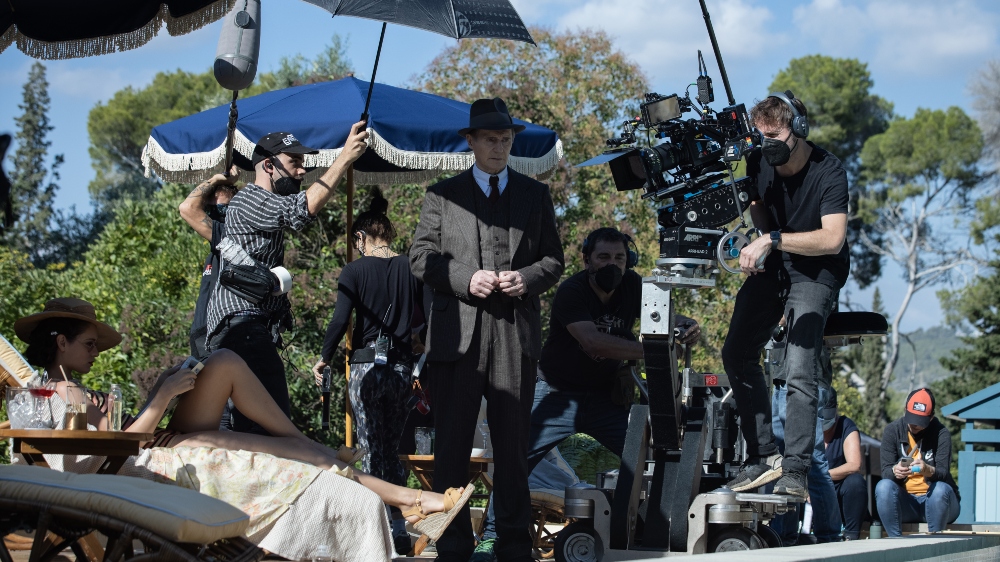
ATL: How much time did you have?
Jordan: About eight weeks. It’s an independent movie, [so] you don’t get a lot of time. We were incredibly tightly scheduled, almost down to its fingertips.
ATL: You stage a great chase sequence after Marlowe meets Lynn Peterson (Daniela Melchior), featuring a lot of angles and setups. Did that take a long time?
Jordan: Oh my God, no, we had to do that in [one] morning. Maybe we had a day, but nothing more than that. It wasn’t that kind of movie. This was an independent film without a very large budget. I didn’t have those kinds of indulgences available to me.
ATL: How did you approach the action scenes in general? Neeson is past the age of brawls and fisticuffs.
Jordan: This movie wasn’t about that. The reason I wanted Liam to play this role is [that] I wanted to release him in a way from that kind of tough-guy acting movie imperative. Really give him a bit of room to breathe for a change. To smolder, you know, and he does smolder wonderfully, Liam is an actor with a huge amount [of] emotional capabilities. The action realm exercises just one of [his] muscles. He has many more muscles than that.
ATL: The way that he listens is just fascinating.
Jordan: Yes. I particularly love his smile when this one villain is blown away with a submachine gun. It’s barely the hint of a smile, but it’s there. That’s the kind of actor he is.
Marlowe is now playing in theaters nationwide.


